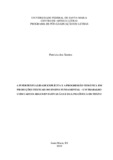| dc.creator | Santos, Patricia dos | |
| dc.date.accessioned | 2019-12-20T14:59:55Z | |
| dc.date.available | 2019-12-20T14:59:55Z | |
| dc.date.issued | 2019-11-14 | |
| dc.identifier.uri | http://repositorio.ufsm.br/handle/1/19209 | |
| dc.description.abstract | The aim of this doctoral study is to investigate how the relationship between explicit intertextuality and thematic progression helps in the written productions of 9th grade students, based on the work with the genres, such as letter from the reader, complaint letter and open letter. The specific objectives elaborated for the research are: to verify if the postulates of Text Linguistics, based on action research, favor the teaching and learning processes of textual production in the classroom; to find out if the principles of process writing contribute to the writing development of elementary school students; to reflect if the Interactive Textual Evaluation helps in the improvement of the rewriting of the students’ texts, in order to approach intertextuality and thematic progression. The work is anchored in Vygotsky ([1984], 2007; [1988], 2014 e 1989), Beaugrande and Dressler (1981), Marcuschi (1983, 2012), Koch (2015), Fávero and Koch (2012), Koch, Bentes and Cavalcante (2012), Thiollent (2011), Burns (1999, 2010), Dolz and Schneuwly (2004), among others. White and Arndt's (1991) Process Writing supports the research methodology, which is qualitative. This research is justified by the opportunity to ensure that factors/elements of textuality, such as intertextuality and thematic progression, have space in the forwarding of argumentative written production in the elementary school classroom. Regarding the results, according to the analysis, we can state that the students' productions progressed the theme(s), mainly through the use of explicit intertextuality. It is also verified that the relationship between intertextuality and thematic progression happens, above all, through explicit intertextuality by reference to texts. About the written textual production, in the classroom, the students lived the experience of the writing process, that is, they lived the text as a learning process containing dialogical (interactive textual) evaluation and opportunity for rewriting. Thus, we understand that both intertextuality and thematic progression are indispensable when working with argumentative written production, especially with elementary school students. | eng |
| dc.description.sponsorship | Coordenação de Aperfeiçoamento de Pessoal de Nível Superior - CAPES | por |
| dc.language | por | por |
| dc.publisher | Universidade Federal de Santa Maria | por |
| dc.rights | Attribution-NonCommercial-NoDerivatives 4.0 International | * |
| dc.rights.uri | http://creativecommons.org/licenses/by-nc-nd/4.0/ | * |
| dc.subject | Intertextualidade | por |
| dc.subject | Escrita argumentativa | por |
| dc.subject | Ensino fundamental | por |
| dc.subject | Intertextuality | eng |
| dc.subject | Elementary school | eng |
| dc.subject | Argumentative writing | eng |
| dc.title | A intertextualidade explícita e a progressão temática em produções textuais do ensino fundamental – um trabalho com cartas argumentativas à luz da linguística do texto | por |
| dc.title.alternative | Explicit intertextuality and thematic progress in textual products of elementary school – a work with argumentative letters based on text linguistics | eng |
| dc.type | Tese | por |
| dc.description.resumo | O presente estudo de doutorado tem por objetivo geral investigar como a relação entre a intertextualidade explícita e a progressão temática auxilia nas produções escritas de estudantes do 9º ano do Ensino Fundamental, a partir do trabalho com os gêneros carta do leitor, carta de reclamação e carta aberta. Os objetivos específicos elaborados para a pesquisa são: verificar se os postulados da Linguística do Texto, a partir da pesquisa-ação, favorecem o processo de ensino e aprendizagem de produção textual em sala de aula; averiguar se os princípios da escrita processo contribuem para o desenvolvimento da escrita de estudantes do Ensino Fundamental; refletir se a Avaliação Textual Interativa auxilia no aprimoramento da reescrita dos textos dos estudantes, no intuito de aproximar intertextualidade e progressão temática. O trabalho apresenta-se ancorado em Vygotsky ([1984], 2007; [1988], 2014 e 1989), Beaugrande e Dressler (1981), Marcuschi (1983, 2012), Koch (2015), Fávero e Koch (2012), Koch, Bentes e Cavalcante (2012), Thiollent (2011), Burns (1999, 2010), Dolz e Schneuwly (2004), e outros. A escrita processo (Process Writing), de White e Arndt (1991), subsidia a metodologia da pesquisa que, por sua vez, é qualitativa. Esta pesquisa justifica-se por oportunizar que fatores/elementos de textualidade, como a intertextualidade e a progressão temática, tenham espaço no encaminhamento da produção escrita argumentativa na sala de aula do Ensino Fundamental. No que tange aos resultados, conforme as análises, pode-se afirmar que as produções dos estudantes progrediram o(s) tema(s), principalmente, a partir do uso de intertextualidade explícita. Verifica-se, ainda, que a relação entre intertextualidade e progressão temática acontece, sobretudo, por meio de intertextualidade explícita por remissão a textos. Acerca da produção textual escrita, em sala de aula, os estudantes vivenciaram a experiência do processo de escrita, isto é, viveram o texto como um processo de aprendizagem contendo avaliação dialogada (textual interativa) e oportunidade de reescrita(s). Desse modo, compreende-se que tanto a intertextualidade quanto a progressão temática são indispensáveis para o trabalho com a produção escrita argumentativa, especialmente com estudantes de Ensino Fundamental. | por |
| dc.contributor.advisor1 | Motta, Vaima Regina Alves | |
| dc.contributor.advisor1Lattes | http://lattes.cnpq.br/0273630781694767 | por |
| dc.contributor.referee1 | Souza, Antonio Escandiel de | |
| dc.contributor.referee1Lattes | http://lattes.cnpq.br/5929342981959320 | por |
| dc.contributor.referee2 | De Conto, Janete Maria | |
| dc.contributor.referee2Lattes | http://lattes.cnpq.br/5025251887185654 | por |
| dc.contributor.referee3 | Leão, Rosaura Maria Albuquerque | |
| dc.contributor.referee3Lattes | http://lattes.cnpq.br/6986650415384917 | por |
| dc.contributor.referee4 | Soares, Simone Mendonça | |
| dc.contributor.referee4Lattes | http://lattes.cnpq.br/1492355695658758 | por |
| dc.creator.Lattes | http://lattes.cnpq.br/3761772709619351 | por |
| dc.publisher.country | Brasil | por |
| dc.publisher.department | Letras | por |
| dc.publisher.initials | UFSM | por |
| dc.publisher.program | Programa de Pós-Graduação em Letras | por |
| dc.subject.cnpq | CNPQ::LINGUISTICA, LETRAS E ARTES::LETRAS | por |
| dc.publisher.unidade | Centro de Artes e Letras | por |



